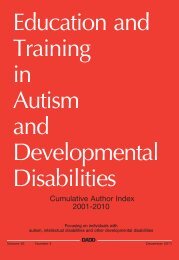Download the Journal (PDF) - Division on Autism and ...
Download the Journal (PDF) - Division on Autism and ...
Download the Journal (PDF) - Division on Autism and ...
You also want an ePaper? Increase the reach of your titles
YUMPU automatically turns print PDFs into web optimized ePapers that Google loves.
young adult. In additi<strong>on</strong> to examining <str<strong>on</strong>g>the</str<strong>on</strong>g><br />
impact of guardianship, it was anticipated that<br />
<str<strong>on</strong>g>the</str<strong>on</strong>g> young adults who participated in this study<br />
would affirm an assumpti<strong>on</strong> that a schoolaged<br />
young adult with developmental disability<br />
who had full legal guardian appointed<br />
would exhibit few, if any, self-determinati<strong>on</strong><br />
skills in comparis<strong>on</strong> to a peer who did not<br />
have a guardian. Surprisingly, this was not <str<strong>on</strong>g>the</str<strong>on</strong>g><br />
case. As a result, <str<strong>on</strong>g>the</str<strong>on</strong>g> findings of <str<strong>on</strong>g>the</str<strong>on</strong>g>se case<br />
studies extend <str<strong>on</strong>g>the</str<strong>on</strong>g> research by providing <str<strong>on</strong>g>the</str<strong>on</strong>g><br />
first examinati<strong>on</strong> of how guardians, legal or<br />
o<str<strong>on</strong>g>the</str<strong>on</strong>g>rwise, impact <str<strong>on</strong>g>the</str<strong>on</strong>g> self-determinati<strong>on</strong> opportunities<br />
for school-aged young adults with<br />
developmental disabilities.<br />
Despite <str<strong>on</strong>g>the</str<strong>on</strong>g> importance of family <strong>and</strong><br />
teacher efforts to promote self-determinati<strong>on</strong><br />
of young adults, o<str<strong>on</strong>g>the</str<strong>on</strong>g>r forces (e.g., school administrator,<br />
service providers) at times impeded<br />
<str<strong>on</strong>g>the</str<strong>on</strong>g>m, as was seen with Kevin. This finding<br />
that a teacher (transiti<strong>on</strong> coordinator)<br />
actively promoted <str<strong>on</strong>g>the</str<strong>on</strong>g> development of students’<br />
self-determinati<strong>on</strong> skills c<strong>on</strong>trasts <str<strong>on</strong>g>the</str<strong>on</strong>g><br />
findings of <str<strong>on</strong>g>the</str<strong>on</strong>g> Wehmeyer, Agran, <strong>and</strong><br />
Hughes (2000) <strong>and</strong> Katsyannis, Zhang, Woodruff,<br />
<strong>and</strong> Dix<strong>on</strong> (2005) studies where teachers<br />
realized <str<strong>on</strong>g>the</str<strong>on</strong>g> importance of self-determinati<strong>on</strong><br />
skills, but did not necessarily teach <str<strong>on</strong>g>the</str<strong>on</strong>g>m. A<br />
c<strong>on</strong>cern raised in this study, ra<str<strong>on</strong>g>the</str<strong>on</strong>g>r, is <str<strong>on</strong>g>the</str<strong>on</strong>g><br />
disc<strong>on</strong>nect observed between <str<strong>on</strong>g>the</str<strong>on</strong>g> school administrator’s<br />
percepti<strong>on</strong> of Kevin’s competence<br />
<strong>and</strong> <str<strong>on</strong>g>the</str<strong>on</strong>g> parents’ values <strong>and</strong> teacher’s<br />
role in helping <str<strong>on</strong>g>the</str<strong>on</strong>g> student dem<strong>on</strong>strate his<br />
abilities. It was almost as if <str<strong>on</strong>g>the</str<strong>on</strong>g> fact that Kevin<br />
had a developmental disability, <str<strong>on</strong>g>the</str<strong>on</strong>g> administrator<br />
assumed incompetence.<br />
Turnbull <strong>and</strong> Turnbull (2001) suggested<br />
that individuals with developmental disabilities<br />
most likely will require <strong>on</strong>going support<br />
from o<str<strong>on</strong>g>the</str<strong>on</strong>g>rs to experience a quality life. Unfortunately,<br />
in this study it appeared that<br />
Kevin <strong>and</strong> his parents would be challenged<br />
with building alliances that would enable<br />
Kevin to be self-determined. Although <str<strong>on</strong>g>the</str<strong>on</strong>g><br />
transiti<strong>on</strong> coordinator <strong>and</strong> families are applauded<br />
for teaching self-determinati<strong>on</strong> skills,<br />
a need exists to work <strong>on</strong> such skill development<br />
within a larger c<strong>on</strong>text, bey<strong>on</strong>d <str<strong>on</strong>g>the</str<strong>on</strong>g><br />
school building. Teaching students self-determinati<strong>on</strong><br />
skills (e.g., making choices) is important,<br />
but perhaps more important is ensuring<br />
significant o<str<strong>on</strong>g>the</str<strong>on</strong>g>rs, including pers<strong>on</strong>al<br />
assistants from community agencies, acknowl-<br />
290 / Educati<strong>on</strong> <strong>and</strong> Training in Developmental Disabilities-September 2008<br />
edge <strong>and</strong> respect <str<strong>on</strong>g>the</str<strong>on</strong>g> students’ communicati<strong>on</strong>.<br />
It has been argued that individuals with<br />
disabilities have had limited influence over<br />
<str<strong>on</strong>g>the</str<strong>on</strong>g>ir lives <strong>and</strong> c<strong>on</strong>versely have had <str<strong>on</strong>g>the</str<strong>on</strong>g>ir lives<br />
unnecessarily c<strong>on</strong>trolled by o<str<strong>on</strong>g>the</str<strong>on</strong>g>rs (Lisi et al.),<br />
<strong>and</strong> as a result, a cycle of dependency <strong>and</strong> less<br />
independence may be created. Kevin’s parents<br />
made substantial effort to establish envir<strong>on</strong>ments<br />
where <str<strong>on</strong>g>the</str<strong>on</strong>g>ir s<strong>on</strong> could express <strong>and</strong><br />
fur<str<strong>on</strong>g>the</str<strong>on</strong>g>r develop his self-determinati<strong>on</strong> skills,<br />
however Kevin’s expressi<strong>on</strong>s were stifled, even<br />
in his own home. This finding is in c<strong>on</strong>trast to<br />
a study c<strong>on</strong>ducted by Wehmeyer, Kelchner,<br />
<strong>and</strong> Richards (1995) who found that adults<br />
with developmental disabilities who lived independently<br />
were more self-determined than<br />
individuals who lived in group homes. The<br />
findings from this study are more aligned with<br />
<str<strong>on</strong>g>the</str<strong>on</strong>g> results from <str<strong>on</strong>g>the</str<strong>on</strong>g> Wehmeyer <strong>and</strong> Metzler<br />
(1995) study were adults with developmental<br />
disabilities indicated that <str<strong>on</strong>g>the</str<strong>on</strong>g>y had limited<br />
c<strong>on</strong>trol over important life choices <strong>and</strong> decisi<strong>on</strong>s.<br />
Wehmeyer <strong>and</strong> Metzler c<strong>on</strong>cluded that<br />
people with developmental disabilities may be<br />
in envir<strong>on</strong>ments that are overly structured or<br />
protective <strong>and</strong> do not place emphasis <strong>on</strong> opportunities<br />
to make meaningful choices <strong>and</strong><br />
decisi<strong>on</strong>s <strong>and</strong> solve problems.<br />
This study has also brought to light that<br />
‘guardian’ may be interpreted in a variety of<br />
ways. If not having a guardian means an individual<br />
is living a life based <strong>on</strong> <str<strong>on</strong>g>the</str<strong>on</strong>g>ir values,<br />
preferences, <strong>and</strong> choices without external<br />
forces, Kevin had a guardian, <strong>and</strong> in fact several<br />
– <str<strong>on</strong>g>the</str<strong>on</strong>g>y just were not court appointed.<br />
Many of <str<strong>on</strong>g>the</str<strong>on</strong>g> decisi<strong>on</strong>s he attempted to communicate<br />
(e.g., desire for a cola instead of<br />
milk), although not life critical, were not h<strong>on</strong>ored.<br />
For Jack, who had a legal guardian, it<br />
was clear to whom he interacted with that he<br />
made many decisi<strong>on</strong>s. Jack was exercising selfdeterminati<strong>on</strong>,<br />
even with <str<strong>on</strong>g>the</str<strong>on</strong>g> fact he had a<br />
legal guardian. The findings from this study<br />
for <strong>on</strong>e individual, Jack, suggest that guardian<br />
appointments may not impact <str<strong>on</strong>g>the</str<strong>on</strong>g> day to day<br />
decisi<strong>on</strong>-making of some individuals. His parents<br />
admitted that <str<strong>on</strong>g>the</str<strong>on</strong>g>y have not needed to<br />
use <str<strong>on</strong>g>the</str<strong>on</strong>g>ir legal authority, however, since <str<strong>on</strong>g>the</str<strong>on</strong>g>y<br />
became legal guardians three years earlier. As<br />
a point of cauti<strong>on</strong>, Jack’s situati<strong>on</strong> may be<br />
excepti<strong>on</strong>al in that he had a family network to<br />
support him which c<strong>on</strong>trasts findings found in
















